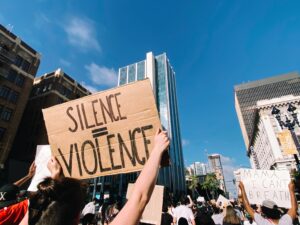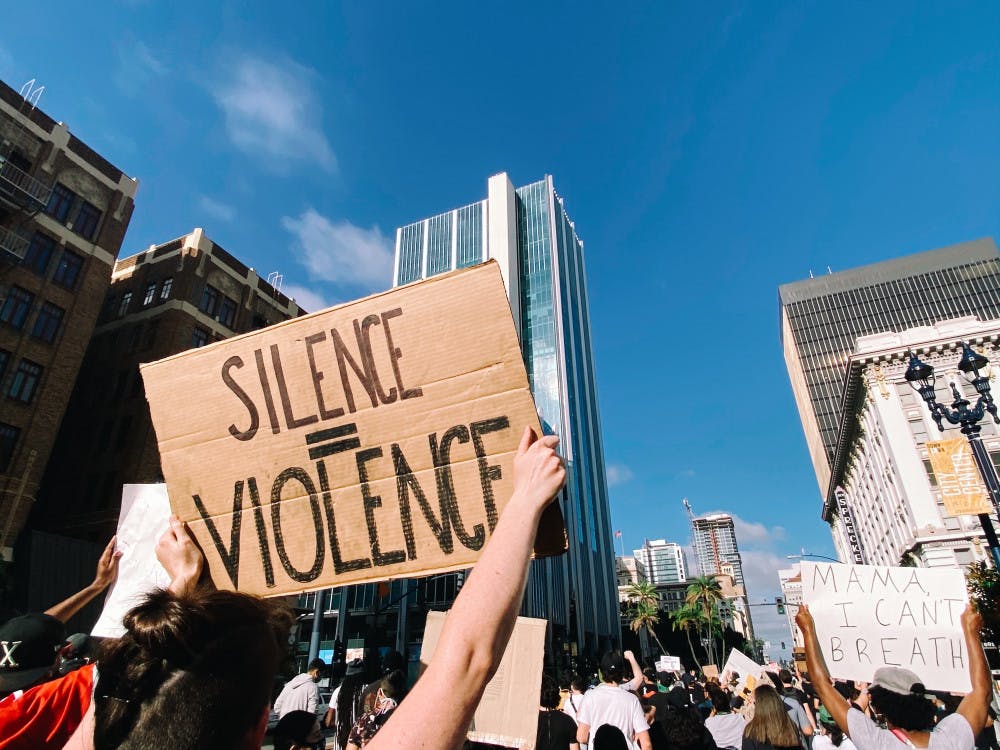By Danielle Silvia
Copy Editor
DeRay Mckesson struggled against each crash of the water’s waves as they nearly capsized his raft. Whitewater rafting was harder than he initially expected, and it was an obstacle he knew he couldn’t face alone.

This was not a typical challenge for Mckesson, a political activist known most recently for his advocacy of the Black Lives Matter movement. Daily, he rallies people around him to fight against systematic societal injustices that threaten to overturn society and leave humanity drowning in the mistakes of its past.
On Dec. 4, students at the College attended Mckesson’s lecture on civil rights and activism in Mayo Concert Hall. The event was sponsored by the Black Student Union and the College Union Board. During his lecture, Mckesson described how his childhood experiences led to a career in social justice.
Growing up, Mckesson was an avid reader. His curiosity and tenacity soon turned into a passion for activism.
“Activism isn’t just having a strong belief about something,” Mckesson said. “It’s about talking to people and spreading awareness about topics that matter in making the world a better place.”
After graduating from Bowdoin College, Mckesson worked for the Teach for America program in Baltimore. Mckesson continued working in the city’s schools through 2016, when he was named chief personnel officer for Baltimore City Public Schools.
Mckesson’s growing audience on social media provides a simple and effective platform for his activism. He uses Twitter to advocate for Black Lives Matter, anti-violence initiatives and victims of police brutality. He uses the internet to peacefully assemble people behind his causes.
Whether it be fighting animal cruelty or ending hunger, Mckesson believes developing a team to support your mission is essential to gaining steady ground in making real change.
Mckesson works alongside fellow activists through protests and peaceful demonstrations, including organized marches after the shooting of Alton Sterling in Baton Rouge, Louisiana and the Charleston, South Carolina church shooting.
Sarah Bennett, a junior elementary education and English double major, expressed her belief in teamwork in order to further a cause.
“As president of the Black Student Union, we as a team try to foster the thoughts behind actions,” Bennett said. “Mckesson aligns with what the BSU works toward in learning how to voice your opinion in a hot political climate.”
Mckesson also stated the importance of navigating through issues that are close to home and encouraged aspiring activists to start with common issues on campus.
Clubs like BSU have promoted awareness of the Black Lives Matter movement on campus.
Vanessa Fiore, a senior international studies major and president of NAACP’s chapter at the College, said Mckesson’s lecture inspired her both personally and professionally.
“We are all trying to solve problems on campus in the Ewing and Trenton area to accomplish intangible things, like better education and fair equality of all races, during our time as students here,” Fiore said. “Mckesson really touched upon how we can easily take small actions every day to make a better place for us to thrive in.”
Mckesson feels a strong sense of fulfillment from his work, and could not imagine his life any other way.
“Meeting other incredible people and seeing their creativity put into action is without a doubt, the most rewarding part of my job,” Mckesson said.
He stressed that society is arguing about the same issues but not recognizing that in the end, everyone wants the same fundamental things. Mckesson believes coming together despite personal differences is how we should approach systematic issues such as inequality in race or education.
Mckesson also opened up to the audience about his identity as a homosexual black man. For Mckesson, a large part of advocacy has been identifying himself through these different layers of intersectionality and enduring different forms of social oppression due to his identity.
“Not having these conversations about intersectionality and justice is what halts activism,” Mckesson said. “It really just takes a simple conversation, and not talking about these issues traps you in the present.”
Throughout history, civil rights activists have touched many lives. Mckesson showed that activism can take many forms, and while the results may be difficult to achieve, everyone holds a responsibility to see them through.
“We all have a role to play,” Mckesson said. “It is necessary that each of us acknowledge that role in learning from each other and making the world a little brighter.”







